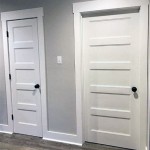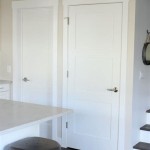How to Cover Up Cinder Block Interior Walls
Cinder block walls, while durable and cost-effective, often present an aesthetic challenge in interior spaces. Their rough, unfinished appearance may not suit all design preferences. Fortunately, several methods exist to cover cinder blocks and create a more polished, inviting interior.
Applying Drywall
Drywall offers a classic, versatile solution for covering cinder block. It creates a smooth surface ideal for painting or wallpapering. Installation involves attaching furring strips to the cinder block and then screwing drywall sheets to the strips. This method provides a thermal break and creates a cavity for running wiring or insulation.
Using Plaster
Plastering directly onto cinder block is another effective covering method. This approach involves applying a base coat of plaster, followed by a finish coat. Plaster creates a solid, durable finish that can be textured or smoothed. It also provides excellent soundproofing qualities.
Paneling Options for Cinder Block
Various paneling materials offer attractive and efficient ways to cover cinder block walls. Wood paneling brings warmth and character to a space. PVC panels provide a waterproof, easy-to-clean surface, particularly suitable for basements or utility areas. Metal panels offer a sleek, modern aesthetic.
Painting Cinder Block Directly
Painting cinder block directly is a budget-friendly option that can significantly improve its appearance. This method requires proper surface preparation, including cleaning and priming, to ensure paint adhesion. Specialized masonry paints are recommended for optimal durability and coverage.
Utilizing a Cement-Based Coating
Cement-based coatings offer a durable and waterproof finish suitable for high-moisture areas like bathrooms and kitchens. These coatings can be applied directly to the cinder block and can be textured or smoothed depending on the desired aesthetic. They provide a robust, low-maintenance solution.
Covering with Tile
Tile offers a stylish and waterproof covering for cinder block walls, especially in bathrooms and kitchens. Applying tile directly to cinder block requires a suitable adhesive and careful surface preparation. Tile provides design flexibility and durability.
Exploring Fabric Coverings
Fabric coverings provide a unique and customizable way to conceal cinder block. Heavy-duty fabrics can be stretched over a frame attached to the wall or adhered directly to the cinder block using a specialized adhesive. This method offers various texture and pattern options.
Using Wood Planks or Shiplap
Adding wood planks or shiplap can transform the look of a cinder block wall, bringing warmth and texture. Attaching the wood to furring strips allows space for wiring or insulation. This method creates a rustic or modern aesthetic depending on the wood type and finish.
Installing a Veneer Stone Finish
Veneer stone offers the appearance of natural stone at a fraction of the cost and weight. Adhering veneer stone to the cinder block surface creates a dramatic and visually appealing finish. This method provides a high-end look suitable for accent walls or fireplaces.
Constructing a Stud Wall in Front
Building a stud wall in front of the cinder block creates a separate wall system. This method offers excellent insulation and soundproofing capabilities while providing a standard surface for finishing with drywall, paneling, or other materials. It adds depth to the room but also reduces usable space.
Preparing the Cinder Block Surface
Regardless of the chosen covering method, proper surface preparation is crucial. Cleaning the cinder block removes dust, dirt, and efflorescence. Repairing any cracks or damage ensures a smooth, even surface for the chosen covering. Applying a primer improves adhesion for paint, plaster, or other materials.
Considerations for Choosing a Covering Method
Several factors influence the choice of covering method, including budget, desired aesthetic, skill level, and the intended use of the space. Evaluating these factors helps determine the most appropriate and effective solution.
Creating a Moisture Barrier
In areas prone to moisture, such as basements, incorporating a moisture barrier is essential. This barrier can be a waterproof membrane applied to the cinder block before installing the chosen covering. This protects against moisture damage and mold growth.
Ensuring Proper Ventilation
Maintaining proper ventilation is crucial, especially in areas where moisture can accumulate. Adequate ventilation prevents condensation and mold growth, helping preserve the integrity of the chosen covering.
Addressing Thermal Considerations
In climates with extreme temperatures, incorporating insulation when covering cinder block walls improves energy efficiency. This can involve placing insulation within the cavity created by furring strips or using insulated panels.
Safety Precautions during Installation
When undertaking any of these covering methods, adhering to safety precautions is paramount. Wearing appropriate safety gear, such as gloves and eye protection, protects against potential hazards during installation. Following manufacturer instructions for materials and tools ensures proper and safe application.

How To Beautifully Transform Your Cinder Block Wall

What Is The Best Way To Dress Up A Cinder Block Wall In Classy Quora

Cinder Block Wall Transformation Nooks In Bloom

Stylish Solutions Covering Unfinished Basement Walls Csg Renovation

Stylish Solutions Covering Unfinished Basement Walls Csg Renovation

10 Ways To Cover Concrete Walls In A Basement Finish

Stylish Solutions Covering Unfinished Basement Walls Csg Renovation

Stylish Solutions Covering Unfinished Basement Walls Csg Renovation

3 Simple Methods How Are Concrete Block Interior Walls Finished

Stylish Solutions Covering Unfinished Basement Walls Csg Renovation
Related Posts








